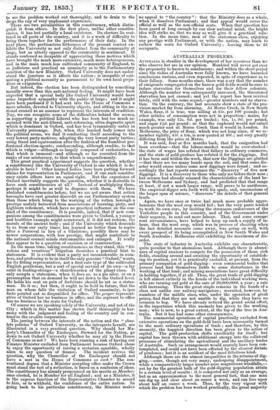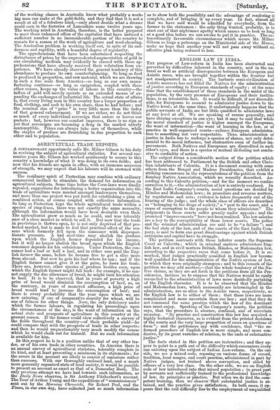AUSTRALIAN PROBLEMS.
AUSTRALIA. is steadier in the development of her resources than we who observe her are in our opinion. Mankind will never get over the propensity to hasten to conclusions ; and within the short period since the riches of Australia were fully known, we have hazarded conclusions various, and even repeated, in spite of experience as to their fallacy. Some months since, there was a cry that the number of emigrants congregated on the barren gold-fields would be sure to induce starvation for themselves and for their fellow colonists. Although the number was subsequently increased, the threatened starvation has not ensued ; and yet the report has been revived lately, still with the same sequel,—greater numbers and no starva- tion. On the contrary, the last accounts show a state of the pro- vision-market far from alarming. At Meroo Creek, in New South Wales, flour, it is true, was selling at 45s. per 100 pounds; but other articles of consumption were not in proportion : maize, for example, was only 128. 6d. per bushel ; tea, is. 9d. per pound, and sugar 40. per pound : so that the cupboard would not entail much greater cost at Meroo Creek than it would in London. In Melbourne, the price of flour, which was not long since, if we re- member rightly, 45l. a ton, is now quoted at 401.; not very greatly differing from the price at Meroo. It was said, four or five months back, that the emigration had been overdone—that the labour-market would be over-stocked : the state of wages has refuted that fallacy in ordinary commerce, and the state of gold-produce has refuted it for the Diggings. But it has been said within the week, that now the Diggings are glutted —that there are too many hands upon the soil, and that some dis- aster would ensue unless some new diggings were found ; and ac- cordingly the last reports announce the " discovery " of five new diggings. It is a discovery to those who only see before their nose ; but science had already scanned the characteristics of the land be- tween Melbourne and Sydney, and had predicted that that range at least, if not a much larger range, will prove to be auriferous. The empirical digger seta forth with his spade, and, unconscious of the larger span of science, " discovers " the details of that general truth.
Again, we have once or twice had much more probable appre- hensions that the wool crop would fail ; but the very panic tended to work its own cure, by inciting the strenuous endeavours of the Yorkshire people in this country, and of the Government under their urgency, to send out more labour. That, and some conojare rent circumstances, have helped to keep up such a supply of la- bour, that the wool crop, which was in process of shearing when the last detailed accounts came away, was going on well, with every prospect of its being accomplished in New South Wales and South Australia ; Melbourne still exhibiting the maximum of dis- order.
The state of industry in Australia exhibits one characteristic, quite peculiar to that anomalous land. Although there is abund- ance of capital anxious to compete for the possession of those rich fields, standing around and awaiting the opportunity of establish- ing its position yet it is practically excluded, at present, from the primary occupation of gold-digging: even commercial bodies that possess land find themselves liable to some disturbance in the working of that land ; and mining associations have great difficulty in holding together, if at all. Thus, the great trade of gold-digging is left almost entirely in the hands of the individual working men, who are turning out gold at the rate of 20,000,0001. a year ; a rate still increasing. Thus the great staple remains in the hands of a class not unhke our railway-navigators ; recruited, however, by numbers of the middle class, who, under the orration of great prizes, find that they are not unable to dig, while they have no occasion to beg. We have already noticed the grand social effect, in the importance which this anomaly has given to the working man ; who is now, to a great extent, at the top of the tree in Aus- tralia. But it has had some other consequences. The commercial operations of capital practically excluded from extensive operations on the gold-field have been necessarily turned to the more ordinary operations of trade ; and therefore, by this anomaly, the happiest direction has been given to the action of capital. The gold-production shifts excellently for itself; but capital has been thrown with additional energy into the collateral processes of stimulating the agricultural and the ancillary trades of Australia. Such an arrangement would scarcely have been Con- templated, and could not have been effected by the clearest dictate of prudence ; but it is an accident of the most felicitous kind. Although there are the utmost inequalities in the returns of dig- ging,—some, though not very many, undergoing disappointment, while a comparatively larger number seize magnificent windfalls,— yet by far the greatest bo 1 of the gold-digging population attain to a certain level of results : it is computed not only as an average, but as an approximation to the most general fact, that one man can dig up and dear about an ounce a week, and can live upon about half an ounce a week. Thus, by the very vigour with which the problem has been worked practically, the great majority of the working classes in Australia know what probably a work- ing man can make at the gold-fields and they fins' that it is not a result at all of a fabulous kind,--ody about double what a dresser could earn in the factories of Lancashire some twelve years ago. The working mind in Australia, therefore, is the better prepared to meet those bnhaneed offers of the capitalist that have induced a sufficient number in no inconsiderable portion of the country to remain for a season at the work of agriculture and wool-shearing The Australian problem is working itself out, in spite of its su denness and rapidity, with a beautiful degree of regularity. The apprehensions that have been entertained respecting the disturbance of prices by the unprecedented augmentation of gold in our circulating medium may evidently be classed with those ap- prehensions that have already, received their refutation from ex- perience. We have already observed the general tendency of this abundance to produce its own counterbalancing. So long as food is prodUced in proportion, and raw material, which we are drawing in such a fine scale from America—so long as our own manu- facturing continues—so long as emigration, coupled with those other causes, keeps up the value of labour in this country—the influx of gold will merely operate as an extended means of ex- panding the exchanges of industrial life. The actual state of affairs is that every living man in this country has a larger proportion of food, clothing, and cash to his own share, than he habefore ; and the nominal rise of "price" is very little more than the index of that general enhancement. If we are richer, we do not think so much of every individual sovereign that enters or leaves our pockets ; but, however our comfort improves' there is no sign as yet that sovereigns are becoming a drug in the market utterly contemptible. Prices can always take care of themselves, while the staples of produce are flourishing in due proportion to each other and to population.



































 Previous page
Previous page